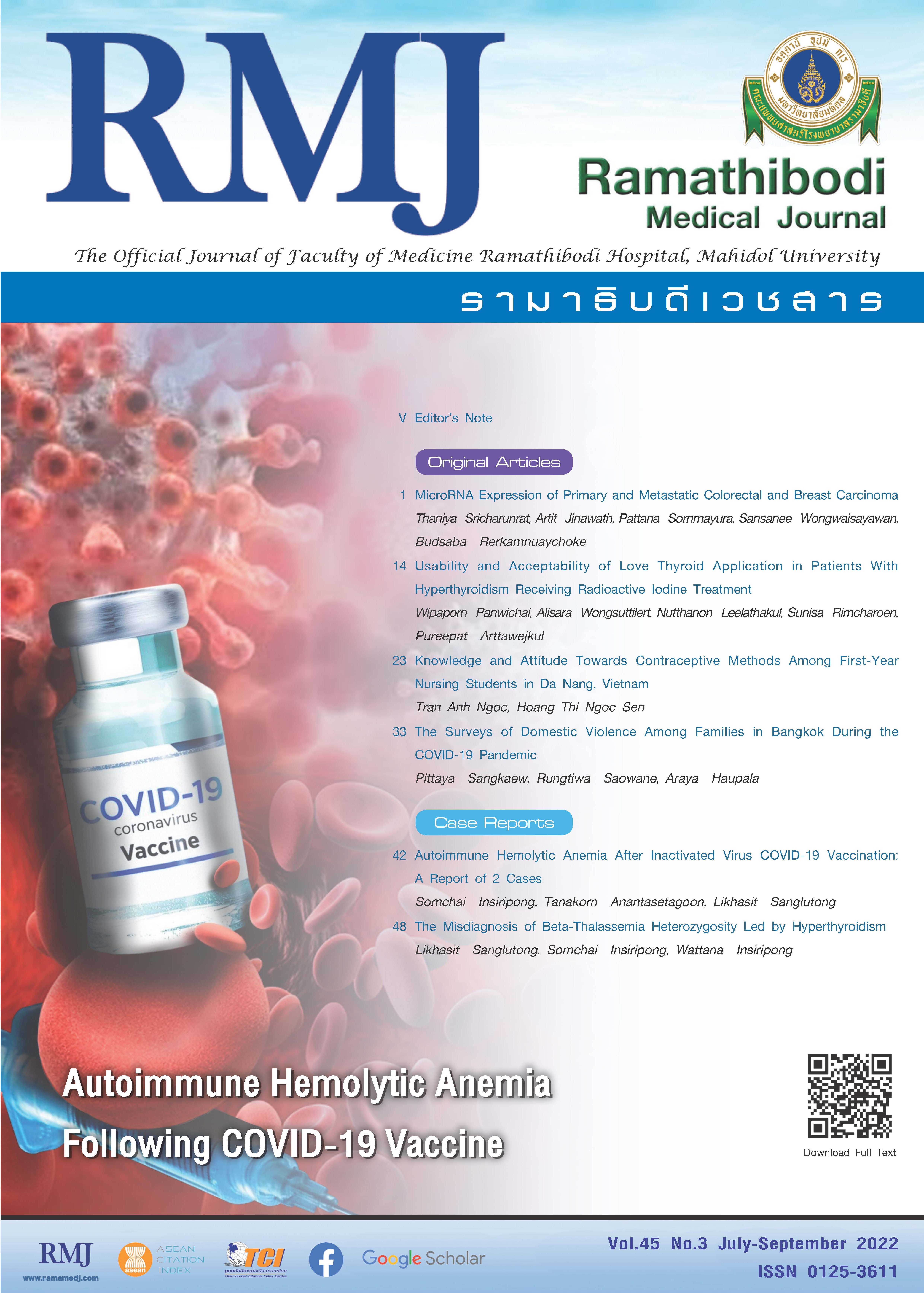Usability and Acceptability of Love Thyroid Application in Patients With Hyperthyroidism Receiving Radioactive Iodine Treatment
DOI:
https://doi.org/10.33165/rmj.2022.45.3.258474Keywords:
Hyperthyroid, Patient care, Electronic book, Mobile applicationAbstract
Background: Telemedicine and e-health services are crucial tools to help patients undergo complex treatments, such as radioactive iodine treatment (RIT), during the COVID-19 pandemic. However, the efficacy of such tools in real-life practice in Thailand is unknown.
Objective: To investigate the usability, acceptability, and user needs for the Love Thyroid application and book among patients with hyperthyroidism.
Methods: A descriptive study, 120 patients with hyperthyroidism who received RIT were given the chance to use both the Love Thyroid application and book. Then, all patients completed the electronic questionnaire that gathers information, including the usability, acceptability and user needs for both media.
Results: The Love Thyroid application was more helpful in following patients up after RIT and has a more attractive design than the book (P < .05). The book was easier to search for information than the application (P < .05). Furthermore, the application had higher acceptability than the book in terms of the confidence in data security, ease of handling, and satisfaction (P < .05). The usefulness of the educational contents was comparable for both media. The application was more likely to be recommended by the patients to others than the book (P < .05).
Conclusions: Mobile applications, such as the Love Thyroid application, had good usability and acceptability as informative tools for patients with hyperthyroidism underwent RIT.
References
Giannoula E, Vrachimis A, Giovanella L, Chatzipavlidou V, Iakovou I. Nuclear thyroidology in pandemic times: the paradigm shift of COVID-19. Hell J Nucl Med. 2020;23 Suppl:41-50.
Ross DS, Burch HB, Cooper DS, et al. 2016 American thyroid association guidelines for diagnosis and management of hyperthyroidism and other causes of thyrotoxicosis. Thyroid. 2016;26(10):1343-1421. doi:10.1089/thy.2016.0229
Winaiprasert P, Mamom J. Development the required daily nutrition applications (NuTu-App) to promote nutrition status in patients with pressure ulcers. Thai Science and Technology Journal. 2019;27(3):485-498. doi:10.14456/tstj.2019.39
Teles S, Ferreira A, Seeher K, Fréel S, Paúl C. Online training and support program (iSupport) for informal dementia caregivers: protocol for an intervention study in Portugal. BMC Geriatr. 2020;20(1):10. doi:10.1186/s12877-019-1364-z
Ryan P, Brown RL, Csuka ME, Papanek P. Efficacy of osteoporosis prevention smartphone app. Nurs Res. 2020;69(1):31-41. doi:10.1097/NNR.0000000000000392
Adu MD, Malabu UH, Malau-Aduli AEO, Malau-Aduli BS. The development of My Care Hub Mobile-Phone App to support self-management in Australians with type 1 or type 2 diabetes. Sci Rep. 2020;10(1):7. doi:10.1038/s41598-019-56411-0
Asghari Amrei S, Ayatollahi H, Salehi SH. A Smartphone application for burn self-care. J Burn Care Res. 2020;41(2):384-389. doi:10.1093/jbcr/irz181
Jain YS, Garg A, Jhamb DK, Jain P, Karar A. Preparing India to leverage power of mobile technology: development of a bilingual mobile health tool for heart patients. Cardiovasc Hematol Agents Med Chem. 2019;17(2):125-134. doi:10.2174/1871525717666190912152938
Li T, Ding W, Li X, Lin A. Mobile health technology (WeChat) for the hierarchical management of community hypertension: protocol for a cluster randomized controlled trial. Patient Prefer Adherence. 2019;13:1339-1352. doi:10.2147/PPA.S215719
Real FJ, Beck AF, DeBlasio D, et al. Dose matters: a smartphone application to improve asthma control among patients at an Urban Pediatric Primary Care Clinic. Games Health J. 2019;8(5):357-365. doi:10.1089/g4h.2019.001
Downloads
Published
How to Cite
Issue
Section
License
Copyright (c) 2022 Ramathibodi Medical Journal

This work is licensed under a Creative Commons Attribution-NonCommercial-NoDerivatives 4.0 International License.

















